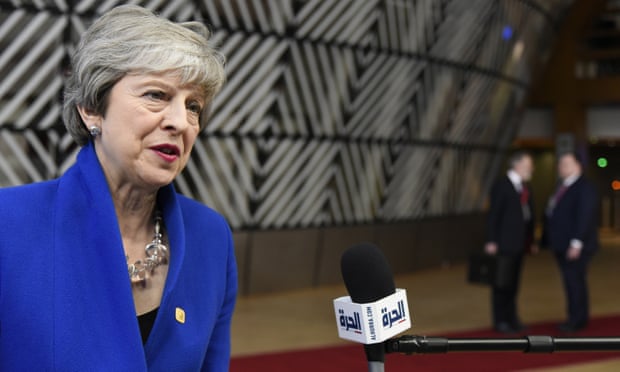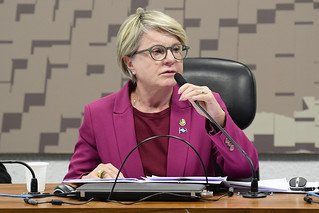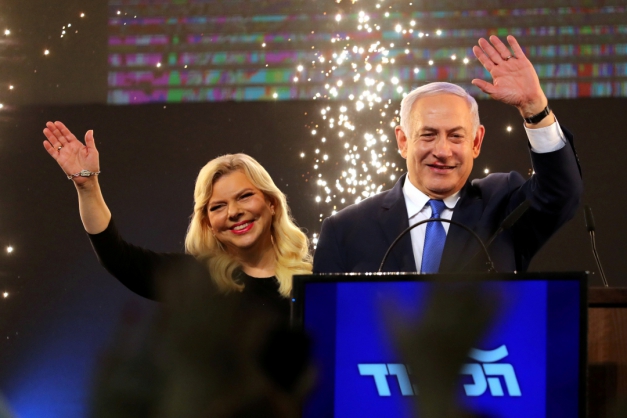British PM says UK will still be able to leave by 22 May if withdrawal deal is approved
Theresa May has signalled that she would accept the EU’s likely offer of a lengthy Brexit delay at a summit of leaders as the UK would still be able to leave when the withdrawal agreement is approved.Arriving in Brussels, the prime minister said it would still possible for Britain to quit by 22 May if the Commons chose to approve her Brexit deal in the coming weeks.
May is expected to have her request for a limited extension to 30 June rejected by the EU27 in favour of a longer potential delay to Brexit of up to a year. The EU is split 50:50 on whether to offer an extension to the end of the year or 31 March 2020. The prime minister has previously said that she could not countenance the UK remaining an EU member state after 30 June, and had wanted to keep pressure on MPs to back her deal by creating another cliff-edge date.
But May told reporters in Brussels that the UK would still be able to leave the bloc under the EU’s likely offer – once parliament had approved the 585-page withdrawal agreement and 26-page political declaration on the future.She said: “The purpose of this summit is to agree an extension, which gives us more time to agree a deal to enable us to leave the EU in that smooth and orderly way.Sign up to our Brexit weekly briefing
Read more – “What matters, I think, is I have asked for an extension to June 30 but what is important is that any extension enables us to leave at the point at which we ratify a withdrawal agreement. So we could leave on 22 May and start to build our brighter future.”The EU wants to avoid being drawn into the British political crisis by offering a short extension only to have to return to the issue within months.But arriving at the summit French president Emmanuel Macron said “nothing was guaranteed” on what he called “the rumours of a long extension”.
France is taking the most hardline stance on a delay to Brexit. “The key for us is that the European project maintains its coherence,” the French president said. While he said the EU27 had stayed together through the Brexit process, he suggested this could not be taken for granted.“The viability and the unity of the European project is still at stake and it is indispensable that nothing is going to compromise the European project in the months to come. We have a European renaissance to drive, I believe profoundly that nothing related to Brexit should block us on this point.”
Other EU leaders sounded more open to a long Brexit delay. Latvia’s prime minister Krišjānis Kariņš said it made sense to give the UK more time to decide what they wanted.“The future of Britain is in Britain’s hands,” he said. “I think it makes sense if the Brits are saying they need a little bit more time to decide what they want, I don’t think we should say no to that. I think we should be open.”
Danish prime minister Lars Lǿkke Rasmussen said he was open to a proposed “flextension” to the end of the year. “I am willing to offer it personally, but the big question is if there is any added value to a long extension. And I think that is what we have to find our from our conversation with Theresa May.”At the last EU summit May failed to impress EU leaders, who found her answers to their questions evasive. Rasmussen said: “tonight there will be a second try.”
Earlier on Wednesday, the German chancellor, Angela Merkel, indicated the thinking of the EU27 before the summit.Speaking in the Bundestag in Berlin, Merkel said the outcome of the special summit “may well be a longer extension than the one the British prime minister asked for”.“But we will shape this extension in such a way that whenever Britain has approved the withdrawal agreement, Britain can then complete its orderly withdrawal very shortly after,” she said.
Merkel, who met May in Berlin on Tuesday, warned the German parliament that the EU had “only 59 hours to stop a disorderly exit from the European Union”.She said: “I can say for the German government that such a scenario, a disorderly exit, is not in our interest. Therefore we are pleased that the British prime minister, who was again in Berlin yesterday, expressed her strong commitment to find a way out of this difficult situation together with the opposition in the lower house.
“She therefore requested an extension of the exit date until 30 June . We know that such talks across parliamentary groups require compromise and time, so I and the government are of the opinion that we should offer both parties a reasonable amount of time, because an orderly exit is only possible in cooperation with the UK.”“We understand from the British prime minister’s letter that the UK is willing to prepare for participating in the European election,” she said. “If an approval of the withdrawal agreement isn’t possible by 22 May, then the European election will be carried out in the UK on Thursday, 23 May.”
May is meeting Donald Tusk, the European council president, before she addresses the 27 heads of state and government at the evening summit. The leaders are then expected to debate their response deep into the night.Under the terms of its extended membership, the UK will be asked to sign up to an “enhanced duty of sincere cooperation” with the EU, in reference to a responsibility to keep out of the bloc’s long-term planning.
France, among others, wants the summit communique to add in language stating that the “UK will not obstruct decisions taken at 27”.Belgium’s prime minister, Charles Michel, said it would be crucial for the EU27 to have guarantees during any extension for the “good functioning of the European Union institutions”.The Dutch prime minister, Mark Rutte, echoed these sentiments, saying: “We need to make sure that the EU can function, that all member states cooperate loyally.”
France is leading the charge for tough conditions on the extension and thinks that the current draft proposals are insufficient. “If there is a long extension, there would be very strict conditions [to ensure] the functioning of the EU and is institutions,” a senior diplomat said.The prime minister also needs to convince her fellow leaders that she intends the UK to participate in European elections, the source said.
“There is a doubt about whether the UK is going to participate in the European elections or not,” the diplomat said, adding that any failure to elect MEPs would mean an exit date in June. “The elections are not a formality. The European elections are a European vote, where the elections in the UK concern us all.”







